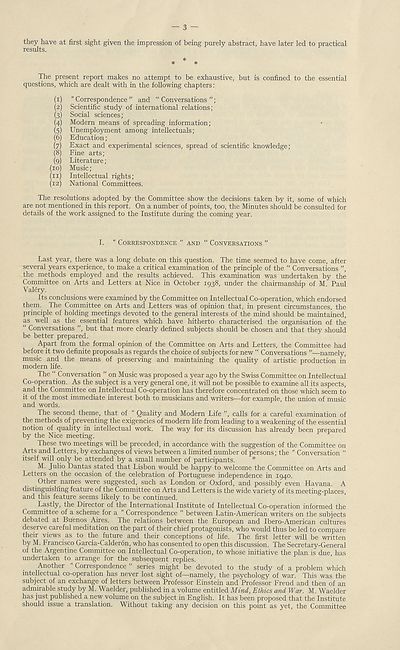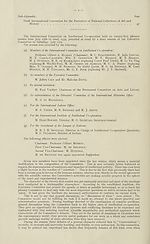International > Report by the committee on the work of its ... plenary session > Twenty first plenary session
(3)
Download files
Complete book:
Individual page:
Thumbnail gallery: Grid view | List view

3 —
they have at first sight given the impression of being purely abstract, have later led to practical
results.
*
* *
The present report makes no attempt to be exhaustive, but is confined to the essential
questions, which are dealt with in the following chapters:
(1) “ Correspondence ” and " Conversations ” ;
(2) Scientific study of international relations;
(3) Social sciences;
(4) Modern means of spreading information;
(5) Unemployment among intellectuals;
(6) Education;
(7) Exact and experimental sciences, spread of scientific knowledge;
(8) Fine arts;
(9) Literature;
(10) Music;
(11) Intellectual rights;
(12) National Committees.
The resolutions adopted by the Committee show the decisions taken by it, some of which
are not mentioned in this report. On a number of points, too, the Minutes should be consulted for
details of the work assigned to the Institute during the coming year.
I. “ Correspondence ” and “ Conversations ”
Last year, there was a long debate on this question. The time seemed to have come, after
several years experience, to make a critical examination of the principle of the " Conversations ”,
the methods employed and the results achieved. This examination was undertaken by the
Committee on Arts and Letters at Nice in October 1938, under the chairmanship of M. Paul
Valery.
Its conclusions were examined by the Committee on Intellectual Co-operation, which endorsed
them. The Committee on Arts and Letters was of opinion that, in present circumstances, the
principle of holding meetings devoted to the general interests of the mind should be maintained,
as well as the essential features which have hitherto characterised the organisation of the
“ Conversations ”, but that more clearly defined subjects should be chosen and that they should
be better prepared.
Apart from the formal opinion of the Committee on Arts and Letters, the Committee had
before it two definite proposals as regards the choice of subjects for new “ Conversations ”—namely,
music and the means of preserving and maintaining the quality of artistic production in
modern life.
The “ Conversation ” on Music was proposed a year ago by the Swiss Committee on Intellectual
Co-operation. As the subject is a very general one, it will not be possible to examine all its aspects,
and the Committee on Intellectual Co-operation has therefore concentrated on those which seem to
it of the most immediate interest both to musicians and writers—for example, the union of music
and words.
The second theme, that of “ Quality and Modern Life ”, calls for a careful examination of
the methods of preventing the exigencies of modern life from leading to a weakening of the essential
notion of quality in intellectual work. The way for its discussion has already been prepared
by the Nice meeting.
These two meetings will be preceded, in accordance with the suggestion of the Committee on
Arts and Letters, by exchanges of views between a limited number of persons; the “ Conversation ”
itself will only be attended by a small number of participants.
M. Julio Dantas stated that Lisbon would be happy to welcome the Committee on Arts and
Letters on the occasion of the celebration of Portuguese independence in 1940.
Other names were suggested, such as London or Oxford, and possibly even Havana. A
distinguishing feature of the Committee on Arts and Letters is the wide variety of its meeting-places,
and this feature seems likely to be continued.
Lastly, the Director of the International Institute of Intellectual Co-operation informed the
Committee of a scheme for a “ Correspondence ” between Latin-American writers on the subjects
debated at Buenos Aires. The relations between the European and Ibero-American cultures
deserve careful meditation on the part of their chief protagonists, who would thus be led to compare
their views as to the future and their conceptions of life. The first letter will be written
by M. hrancisco Garcia-Calderon, who has consented to open this discussion. The Secretary-General
of the Argentine Committee on Intellectual Co-operation, to whose initiative the plan is due, has
undertaken to arrange for the subsequent replies.
Another Correspondence series might be devoted to the study of a problem which
intellectual co-operation has never lost sight of—namely, the psychology of war. This was the
subject of an exchange of letters between Professor Einstein and Professor Freud and then of an
admirable study by M. Waelder, published in a volume entitled Mind, Ethics and War. M. Waelder
has just published a new volume on the subject in English. It has been proposed that the Institute
should issue a translation. Without taking any decision on this point as yet, the Committee
they have at first sight given the impression of being purely abstract, have later led to practical
results.
*
* *
The present report makes no attempt to be exhaustive, but is confined to the essential
questions, which are dealt with in the following chapters:
(1) “ Correspondence ” and " Conversations ” ;
(2) Scientific study of international relations;
(3) Social sciences;
(4) Modern means of spreading information;
(5) Unemployment among intellectuals;
(6) Education;
(7) Exact and experimental sciences, spread of scientific knowledge;
(8) Fine arts;
(9) Literature;
(10) Music;
(11) Intellectual rights;
(12) National Committees.
The resolutions adopted by the Committee show the decisions taken by it, some of which
are not mentioned in this report. On a number of points, too, the Minutes should be consulted for
details of the work assigned to the Institute during the coming year.
I. “ Correspondence ” and “ Conversations ”
Last year, there was a long debate on this question. The time seemed to have come, after
several years experience, to make a critical examination of the principle of the " Conversations ”,
the methods employed and the results achieved. This examination was undertaken by the
Committee on Arts and Letters at Nice in October 1938, under the chairmanship of M. Paul
Valery.
Its conclusions were examined by the Committee on Intellectual Co-operation, which endorsed
them. The Committee on Arts and Letters was of opinion that, in present circumstances, the
principle of holding meetings devoted to the general interests of the mind should be maintained,
as well as the essential features which have hitherto characterised the organisation of the
“ Conversations ”, but that more clearly defined subjects should be chosen and that they should
be better prepared.
Apart from the formal opinion of the Committee on Arts and Letters, the Committee had
before it two definite proposals as regards the choice of subjects for new “ Conversations ”—namely,
music and the means of preserving and maintaining the quality of artistic production in
modern life.
The “ Conversation ” on Music was proposed a year ago by the Swiss Committee on Intellectual
Co-operation. As the subject is a very general one, it will not be possible to examine all its aspects,
and the Committee on Intellectual Co-operation has therefore concentrated on those which seem to
it of the most immediate interest both to musicians and writers—for example, the union of music
and words.
The second theme, that of “ Quality and Modern Life ”, calls for a careful examination of
the methods of preventing the exigencies of modern life from leading to a weakening of the essential
notion of quality in intellectual work. The way for its discussion has already been prepared
by the Nice meeting.
These two meetings will be preceded, in accordance with the suggestion of the Committee on
Arts and Letters, by exchanges of views between a limited number of persons; the “ Conversation ”
itself will only be attended by a small number of participants.
M. Julio Dantas stated that Lisbon would be happy to welcome the Committee on Arts and
Letters on the occasion of the celebration of Portuguese independence in 1940.
Other names were suggested, such as London or Oxford, and possibly even Havana. A
distinguishing feature of the Committee on Arts and Letters is the wide variety of its meeting-places,
and this feature seems likely to be continued.
Lastly, the Director of the International Institute of Intellectual Co-operation informed the
Committee of a scheme for a “ Correspondence ” between Latin-American writers on the subjects
debated at Buenos Aires. The relations between the European and Ibero-American cultures
deserve careful meditation on the part of their chief protagonists, who would thus be led to compare
their views as to the future and their conceptions of life. The first letter will be written
by M. hrancisco Garcia-Calderon, who has consented to open this discussion. The Secretary-General
of the Argentine Committee on Intellectual Co-operation, to whose initiative the plan is due, has
undertaken to arrange for the subsequent replies.
Another Correspondence series might be devoted to the study of a problem which
intellectual co-operation has never lost sight of—namely, the psychology of war. This was the
subject of an exchange of letters between Professor Einstein and Professor Freud and then of an
admirable study by M. Waelder, published in a volume entitled Mind, Ethics and War. M. Waelder
has just published a new volume on the subject in English. It has been proposed that the Institute
should issue a translation. Without taking any decision on this point as yet, the Committee
Set display mode to:
![]() Universal Viewer |
Universal Viewer | ![]() Mirador |
Large image | Transcription
Mirador |
Large image | Transcription
Images and transcriptions on this page, including medium image downloads, may be used under the Creative Commons Attribution 4.0 International Licence unless otherwise stated. ![]()
| League of Nations > International > Report by the committee on the work of its ... plenary session > Twenty first plenary session > (3) |
|---|
| Permanent URL | https://digital.nls.uk/195386092 |
|---|
| Attribution and copyright: |
|
|---|---|
| Shelfmark | LN.XII.5 |
|---|---|
| Shelfmark | LN.XII |
|---|
| Description | Over 1,200 documents from the non-political organs of the League of Nations that dealt with health, disarmament, economic and financial matters for the duration of the League (1919-1945). Also online are statistical bulletins, essential facts, and an overview of the League by the first Secretary General, Sir Eric Drummond. These items are part of the Official Publications collection at the National Library of Scotland. |
|---|---|
| Additional NLS resources: |
|

